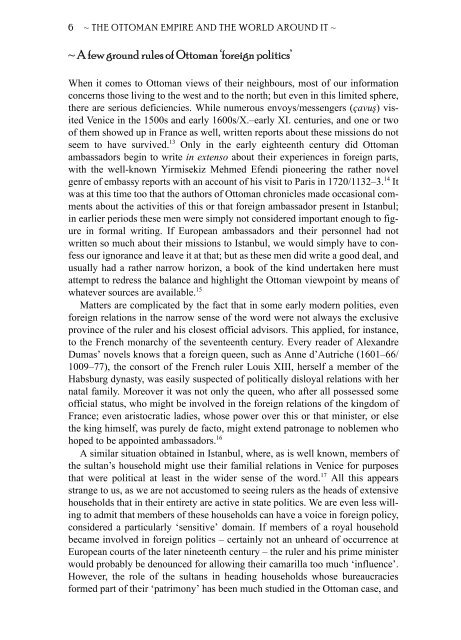The Ottoman Empire and the World Around It - Course Information
The Ottoman Empire and the World Around It - Course Information
The Ottoman Empire and the World Around It - Course Information
You also want an ePaper? Increase the reach of your titles
YUMPU automatically turns print PDFs into web optimized ePapers that Google loves.
6 ~ THE OTTOMAN EMPIRE AND THE WORLD AROUND IT ~<br />
~ A few ground rules of <strong>Ottoman</strong> ‘foreign politics’<br />
When it comes to <strong>Ottoman</strong> views of <strong>the</strong>ir neighbours, most of our information<br />
concerns those living to <strong>the</strong> west <strong>and</strong> to <strong>the</strong> north; but even in this limited sphere,<br />
<strong>the</strong>re are serious deficiencies. While numerous envoys/messengers (çavuş) visited<br />
Venice in <strong>the</strong> 1500s <strong>and</strong> early 1600s/X.–early XI. centuries, <strong>and</strong> one or two<br />
of <strong>the</strong>m showed up in France as well, written reports about <strong>the</strong>se missions do not<br />
seem to have survived. 13 Only in <strong>the</strong> early eighteenth century did <strong>Ottoman</strong><br />
ambassadors begin to write in extenso about <strong>the</strong>ir experiences in foreign parts,<br />
with <strong>the</strong> well-known Yirmisekiz Mehmed Efendi pioneering <strong>the</strong> ra<strong>the</strong>r novel<br />
genre of embassy reports with an account of his visit to Paris in 1720/1132–3. 14 <strong>It</strong><br />
was at this time too that <strong>the</strong> authors of <strong>Ottoman</strong> chronicles made occasional comments<br />
about <strong>the</strong> activities of this or that foreign ambassador present in Istanbul;<br />
in earlier periods <strong>the</strong>se men were simply not considered important enough to figure<br />
in formal writing. If European ambassadors <strong>and</strong> <strong>the</strong>ir personnel had not<br />
written so much about <strong>the</strong>ir missions to Istanbul, we would simply have to confess<br />
our ignorance <strong>and</strong> leave it at that; but as <strong>the</strong>se men did write a good deal, <strong>and</strong><br />
usually had a ra<strong>the</strong>r narrow horizon, a book of <strong>the</strong> kind undertaken here must<br />
attempt to redress <strong>the</strong> balance <strong>and</strong> highlight <strong>the</strong> <strong>Ottoman</strong> viewpoint by means of<br />
whatever sources are available. 15<br />
Matters are complicated by <strong>the</strong> fact that in some early modern polities, even<br />
foreign relations in <strong>the</strong> narrow sense of <strong>the</strong> word were not always <strong>the</strong> exclusive<br />
province of <strong>the</strong> ruler <strong>and</strong> his closest official advisors. This applied, for instance,<br />
to <strong>the</strong> French monarchy of <strong>the</strong> seventeenth century. Every reader of Alex<strong>and</strong>re<br />
Dumas’ novels knows that a foreign queen, such as Anne d’Autriche (1601–66/<br />
1009–77), <strong>the</strong> consort of <strong>the</strong> French ruler Louis XIII, herself a member of <strong>the</strong><br />
Habsburg dynasty, was easily suspected of politically disloyal relations with her<br />
natal family. Moreover it was not only <strong>the</strong> queen, who after all possessed some<br />
official status, who might be involved in <strong>the</strong> foreign relations of <strong>the</strong> kingdom of<br />
France; even aristocratic ladies, whose power over this or that minister, or else<br />
<strong>the</strong> king himself, was purely de facto, might extend patronage to noblemen who<br />
hoped to be appointed ambassadors. 16<br />
A similar situation obtained in Istanbul, where, as is well known, members of<br />
<strong>the</strong> sultan’s household might use <strong>the</strong>ir familial relations in Venice for purposes<br />
that were political at least in <strong>the</strong> wider sense of <strong>the</strong> word. 17 All this appears<br />
strange to us, as we are not accustomed to seeing rulers as <strong>the</strong> heads of extensive<br />
households that in <strong>the</strong>ir entirety are active in state politics. We are even less willing<br />
to admit that members of <strong>the</strong>se households can have a voice in foreign policy,<br />
considered a particularly ‘sensitive’ domain. If members of a royal household<br />
became involved in foreign politics – certainly not an unheard of occurrence at<br />
European courts of <strong>the</strong> later nineteenth century – <strong>the</strong> ruler <strong>and</strong> his prime minister<br />
would probably be denounced for allowing <strong>the</strong>ir camarilla too much ‘influence’.<br />
However, <strong>the</strong> role of <strong>the</strong> sultans in heading households whose bureaucracies<br />
formed part of <strong>the</strong>ir ‘patrimony’ has been much studied in <strong>the</strong> <strong>Ottoman</strong> case, <strong>and</strong>


